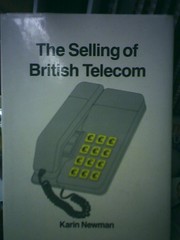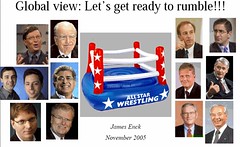
Posting may be a bit thin for a few days. Enjoy the sacred or secular seasonal observance of your choice, or not (that should cover all the potential sensitivities).
Plus ça change...
I bet the Friday afternoon office quiz is brutal.

For our monthly sector product (which I found recently, somewhat to my surprise, that some people actually seem to read) I entitled my end of year piece "Annus horribilis, annus mirabilis," which is precisely how it feels.
As of the close of play today, EuroTelco has underperformed the STOXX 600 by 21% year-to-date, and is the only sector to have lost money in an otherwise buoyant stock market. If investor attitudes were country music song titles, then this year would be called something like "Take Your Share Buyback and Shove It." Results in Q3 contained some bleak outlook statements regarding the next couple of years, to be followed (of course) by a strong recovery - a special Christmas menu of humble pie followed by jam tomorrow.
However, for all the shock and horror, it was a truly amazing year, the likes of which we may not witness again:
I've left a lot out, but as telco watchers of the future will no doubt say, if you can remember 2005 you weren't there!
My favorite telco event of the year was actually a fictional one - the arrival of the Wasp T-12 Speech Tool. I still occasionally get hits, sometimes from telcos and handset makers, searching for this - "What is the ARPU potential?" I can imagine them hopefully saying.
Anyway, it was an amazing year to behold and be part of (in my small virtual way), and no doubt 2006 will bring more wonders and horrors. I look forward to strolling through a nuclear winter EuroTelcoland in 2006 with you, my dear mega-uber value readers. Thanks to all of you for making this the best, and worst, year ever for EuroTelcoblog. God bless us every one.

Dug this old chestnut out yesterday, a very interesting account of the BT IPO process, stolen from the Nikko Securities London library in the days just before the company shut down in late '98. The BT IPO was arguably the pivotal event in the development of the EuroTelcohell investors are living through currently.
UPDATE: Double Platinum Club charter member Chickenman chimes in to let me know that this book is actually very valuable. At £53.78, it's worth 25 BT shares at their current price, or around 3.8 shares at their mid-bubble high. Does that observation in itself prove something?

I alluded to this presentation slide in a previous post, and finally got around to converting it to a .gif using the amazing CaptureWizPro.
"Just for fun, I called Direct Energy and after being transferred three time within Direct Energy’s customer service help desk, they finally asked me to call Rogers Telecom directly…which I did.
As it turns out, you have to subscribe to Rogers' home phone service for $29 CDN in order to get the free minutes and one free service (e.g, call display). At current rates, you can subscribe to a local home phone service from Bell for about $20-23 CDN + $6-8 for the feature. Therefore, Rogers is really using the LD as a simple means of acquiring the customer. While the offer sounds great, it does come at a
price of switching service providers."
"5. The Directive requires more invasive laws. Once adopted, this Directive will prove not to be the ultimate solution against serious crimes. There will be calls for additional draconian measures including:
-the prior identification of all those who communicate, thus requiring ID cards at cybercafes, public telephone booths, wireless hotspots, and identification of all pre-paid clients;
- the banning of all international communications services such as webmail (e.g. Hotmail and Gmail) and blocking the use of non-EU internet service providers and advanced corporate services.
EuroTelcos will scream about the compliance costs, but if the long-term by-product is degradation of user experience for third party communications tools (as well as crushing financially weaker small upstarts), I very much doubt they will drown in their own tears. As with all these attempts at centralized control, however, I'm skeptical - every action invites a reaction, and this is just the incentive for a truly plug-and-play Tor.

The Centrica story alluded to below has started me thinking: once all the hot-ass quadruple play business plans have been executed, what's left for telcos? Well, I think for smart ones it will probably be something which seeks to amortize the costs of multiple other domestic services across a common customer base and set of functions, as Centrica has attempted to do (let's face it, no one cares how good your VOD offering is if they're freezing butt with a broken boiler, or if they're at the mercy of the fluid work schedules and opaque pricing of one of this country's many fine independent builders). At c.10%, operating margins in this business are lower than EuroTelcoland is accustomed to (but interestingly, are more than double that of Centrica's traditional core business). Then again, what are we working towards here, glamor or survival? I wonder how many telcos have considered this as a realistic option for the future, and how many would consider it beneath them somehow?

Nice to be back in London, where advice like this is both readily given and universally ignored. Conveniently, it pretty much sums up investor views on telecom from my series of meetings last week, and also fits in nicely with a view of "the year that was" (the only STOXX 18 sector in negative territory year-to-date, etc...). More red on my screen today, largely as a result of the UK "quadruple play" story, and DowJones is reporting that Centrica has pulled the sale of its OneTel arm after only one bid was submitted at GBP100m. My boss, an energy analyst, reckons this is roughly the amount of invested capital in the business to date, i.e., it's a nil-premium bid.